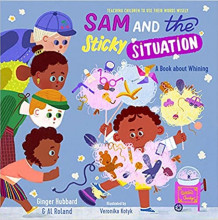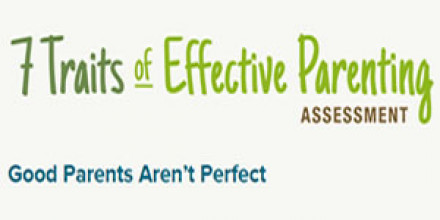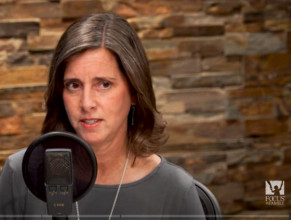
The War of Words
In this Adventures in Odyssey drama, a carelessly uttered word from Eugene creates havoc as it becomes the fashionable insult, resulting in a lesson about the power of words.
Home » Episodes » Focus on the Family Broadcast » Taming Your Child’s Tounge
Child: “Mine! Mine! Mine! It’s mine!”
John Fuller: Well if you’re a parent, I’m sure you’ve heard shouting like that a time or two. This is, Focus on the Family, and your host is Focus president, Jim Daly. I’m John Fuller. And Jim, every parent has to deal with their child making demands, uh, back talking, complaining, lying.
Jim Daly: What?
John: The tongue just seems to be a problem for a lotta kids and adults.
Jim: Well it is and, uh, hopefully by the time we’re at some age we’ve figured it out. But it is, the tongue is a tough thing and we see it right when we can start speaking, pretty much that tongue is unleashed to let it go. How many grocery stores have you been in and, uh, either your own child (laughs) or someone in the store, some little three, four or eight-year-old is going off?
John: Is acting up. Yeah. Uh, I have gotten over my embarrassment at my own kids doing-
Jim: (laughs)
John: … that and I’m trying to just be gracious and kind to parents who are-
Jim: Yes.
John: … suffering that.
Jim: It’s probably the best evidence of the uncontrolled tongue that I’ve ever seen.
John: Mm-hmm.
Jim: And I remember, I’ve said it even on the program, I remember when, uh, Trent wanted a candy at the checkout aisle. I was out of town, Jean’s going through terribly embarrassed and Troy was really little. And Trent’s melting down because he didn’t get this chocolate, and an officer, a military man came over and said, “Son, you need to listen to your mother.” (laughing) And I was like, “I don’t know who that was, but thank you.”
John: Thank you much for doing that. Yeah.
Jim: Trent remembers that to this day. And I think it was the last time he kind of acted out in a checkout line, so it worked. That’s what we need to do, we need to get that guy in here and talk to him about parenting.
John: That’s a good idea.
Jim: (laughs)
John: I like that.
Jim: But today we do wanna talk about this idea of how to help your child better use their tongue. It can be done. I know many of you right now, moms you’re going, “No, you don’t know my four-year-old.” Yes, we do, we’ve seen it and we’re going to address that issue with Ginger Hubbard, who’s written this great book, I Can’t Believe You Just Said That. Wonderful title, by the way. And, uh, it will empower you to, and equip you to, uh, do the better job of parenting that child who has a tongue that’s a little untamed.
John: Mm-hmm. And Ginger is an award-winning author, and speaks at women’s events, uh, parenting conferences, homeschool events. She’s married, has four kids. And uh, by the way, you can get the book, I Can’t Believe You Just Said That, and a CD or a download of our conversation at focusonthefamily.com/broadcast.
Jim: Ginger, welcome to Focus on the Family.
Ginger Hubbard: Thank you for having me. I am thrilled to be here.
Jim: It’s fun. And uh, you know, let- let’s, uh, set it up. When you were single, and as John and I were just talking about, that grocery store exchange, you were that single person watching that poor mom meltdown, saying what to yourself?
Ginger: Saying, “When I have kids, they will not act like that.” (laughing)
Jim: And what happened when you had kids?
Ginger: Well-
Jim: (laughs)
Ginger: … I said that and I would watch those things and think, I’m gonna do things very differently and my children are gonna behave like little angels. And then I’ll tell you what happened, the stick turned blue (laughing) twice. (laughs)
John: Yep.
Ginger: And so I had to learn that, you know, all kids are sinners and will manifest sinful behavior.
Jim: So what was that like, seriously? It’s so much fun to think of that first episode, because when I was single and saw those kids in the store I had the same kinda statement, “You know when I have children, my kids will never do that.” So when it happened to you, really, what ran through your mind?
Ginger: Shock. (laughing) I just didn’t expect it from my kids. But I remember when, especially when mine were young, um, just being shocked by some of the things that would come out of their mouths. Whether it was whining or throwing a fit in the grocery store, or temper tantrums, or uh, talking back, lying, all of those sorts of things. I would just look at them with this shocked expression and ask that question that so many parents ask, “Why do you act like that?”
Jim: Yeah, because I am perfect.
Ginger: Right.
Jim: I am your parent-
Ginger: Right.
Jim: … and I am perfect.
Ginger: Right.
Jim: What happened to you?
Ginger: That’s right. But after a closer look at the word of God, I began to realize that I was asking the wrong question. In Matthew 12:34, Jesus says, “For the mouth speaks what the heart is full of.” In other words, there’s merit to that old saying, “What’s down in the well comes up in the bucket.”
John: (laughs) You’re right.
Ginger: And so we learn that our sin does not begin with our mouths, it begins with our hearts. And it starts a lot sooner than we might think. King David proclaimed, “Surely I was sinful at birth, sinful from the time my mother conceived me.” So when parents really begin to grasp the origin of sin and just the total depravity of the human race in general, we no longer question why our children sin. So I slowly learned to stop asking why does my child sin, and instead I begin to ask myself, when my child sins, how might I point him to the fact that he is a sinner, just like me, in need of a Savior. How can I really help him to understand and live in the transformational power of Christ?
Jim: Yeah. And, but, uh, so the title of the book actually is a bit, uh, misleading, ’cause uh, you know, I Can’t Believe You Just Said That, actually you’re saying, I can believe you said it-
Ginger: That’s right.
Jim: … (laughs) ’cause you’re a sinner. And so-
Ginger: Because I’m a sinner and they’re a sinner-
Jim: Okay.
Ginger: … and so we’re going to sin. We don’t need to be shocked when they sin.
Jim: Right. And I think that’s a critical assessment. How does the parent react in that moment when that little one, who you think you’ve done all the right inputs…
Ginger: Mm-hmm.
Jim: And so often in parenting, and you know we’re guilty of it, trying to give you a formula that says if you do A and B, and C, you’re gonna get D. It doesn’t always work that way.
Ginger: Right.
Jim: It’s an indicator, it’s, uh, you know, something that you could practice to ensure that your child has a better chance of responding in the right way.
Ginger: Mm-hmm.
Jim: But for that parent that is shocked when their three-year-old, in the store, is saying something that, uh, oh my goodness, that came out of their mouth, how do you react as a parent in that moment?
Ginger: Well, what we don’t want to do is to only address the outward behavior. We need to be concerned about the issues of the heart, because that’s what Jesus is concerned about, is the issues of the heart. So, so many parents today, and I used to be like this too, um, in an attempt to get our children to obey and speak respectfully, have adopted these faulty child training methods, which fail to reach the heart.
Jim: What do they look like?
Ginger: They look like threatening, bribing, repeating instructions, um, and just not addressing the issues of the heart. And so, just so many parents have developed this philosophy that if they can get their children to act right by implementing just certain consequences, that they’re raising their kids the right way. But there is far more to parenting than getting our children to act right.
Jim: Well, and I wanna make sure people are catching what you’re saying, ’cause it’s really important. That’s one of the reasons I wanted you to be on the program, because I think what you’re saying is so accurate. And that is, we’re looking… in the wrong way, we’re looking for behavior modification. That if we can control behavior, than we’ve got their heart. That’s not true. And down the road, as a teenager you’re gonna find out, whoops, I didn’t do the job I thought I was doing. So it can actually mask. And I love the approach, going for the heart-
Ginger: Mm-hmm.
Jim: … so how does that parent do that, not respond out of the emotion, attack the behavior, how do they get to the heart? What would be a question you would ask that five-year-old?
Ginger: Well I encourage, and throughout the book, every single chapter in the book deals with a different tongue related offense. And so-
Jim: Which I love, by the way.
Ginger: So it’s very specific, very practical. And step one is, reaching past that outward behavior and getting to the heart. And if you think about it, in so many of the stories in scripture, when someone did something wrong, Jesus didn’t point his finger in their face and say, “This is what you did wrong, and this is what you should’ve done instead!” Instead, Jesus used heart probing questions. And in order for the people to answer those questions, they had to evaluate themselves, because Jesus was a skilled heart prober. He knew how to ask those questions in such a way that the people would have to take their focus off of the circumstances and the situations going on around them, and onto the sin in their own heart. So throughout the book, I know we talked about not having a formula, but I do have a three-step plan for each one of those behaviors. But that three-step plan is based completely on the word of God and the way that Jesus responded to people when they did something wrong. So we can learn from his example.
John: Mm-hmm.
Jim: Well, and- and I’m not afraid of the formula. The only reason I say that regarding a formula, is that some parents apply these principles and if they’re not working, they’re thinking, what happened?
Ginger: Right.
Jim: Uh, here’s the problem, every human being has free will, even your two-year-old-
John: Mm-hmm.
Jim: … and the Lord has allowed that for us, and we have to choose, and we make-
Ginger: Mm-hmm.
Jim: … choices every day. The first and best choice is choosing God, right?
Ginger: Right.
Jim: And then we make choices from there forward.
Ginger: Right.
Jim: And I think that’s the point of the formula, is that you will never override a person’s free will, even a little one’s free will.
Ginger: Right.
Jim: And so, get to the heart-
Ginger: Right.
Jim: … which is why I like the predictive nature of that. If you can get their heart going in the right place, it’s even a greater chance that they’re gonna make good decisions.
Ginger: Right. And when we ask them those heart probing questions like Jesus did, again, that helps them to evaluate themselves and to take ownership for the sin that’s in their heart, which is, um, ultimately going to help them recognize their need for Christ. So, you know, you ask for a specific question. Let’s say, uh, disobeying. Most kids are going to struggle with disobeying, so that’s a pretty common one. Um, say that you tell your three-year-old, you know, to come to you and he stubbornly refuses to obey. Just as a very simple question, “Honey, did you obey or did you disobey?”
Jim: Right.
Ginger: Just asking that question, again, helps them to take ownership for the sin that’s there. And some people say, “Well my child’s stubborn, he just wouldn’t answer that question.” Well don’t get into a power struggle, just answer for them. Just say, “Well sweetie, you disobeyed. How did you disobey? Well I told you to come to me and you didn’t come, and that’s disobeying.” And then one thing that I always told my children before administering any sort of consequence was, “Honey, I love you too much to allow you to disobey.” And something else we wanna teach our children is, what is obedience, what is that? And so, something that I read about in several different parenting books that I adopted with my kids, was at a very young age I could ask them, “How does God want you to obey?” And I could hold up three fingers and they learned, um, to say, “all the way, right away and with a happy heart.”
Jim: That is so good. In the book you talk about faulty parenting. We’ve touched on it, but again, I wanna make sure the parents listening catch what you’re saying.
Ginger: Mm-hmm.
Jim: Specifically, uh, that ignoring aspect. And I think, not to stereotype, but I think a lot of dads can fall into that category where-
Ginger: Mm-hmm.
Jim: … “You know what, they’ll grow out of it, don’t worry about it,” you know, and they’re reassuring mom. Mom’s panicked-
Ginger: Mm-hmm.
Jim: … she full of fear and now control.
Ginger: Right.
Jim: Try to get these kids moving in a better direction. So she’s full of consequences for the kids.
Ginger: Right, right.
Jim: So, uh, describe-
Ginger: Yeah, yeah.
Jim: … those things.
Ginger: So when kids, uh, respond the wrong way, with these verbal offenses, you’re right, parents often respond in one of two ways. They either ignore the child, um, just hoping that he’ll outgrow it. Or, they administer some sort of punishment, hoping to, as we hear people say, “put the fear of God in him”. But both of those methods are ineffective because they fail to train and instruct. To ignore a child who is need of correction may certainly seem more convenient for us sometimes, but to ignore a child that has done something wrong and is need of guidance and training, and instructing, is to selfishly place our own interest above the interest and the wellbeing of the child.
Jim: Yeah, you don’t like conflict or, you know-
Ginger: That’s right.
Jim: … all those things.
Ginger: Right, right. And then on the other hand, consequences for wrong behavior have their place, but they are not a substitute for training and instructing. To just merely administer consequences, um, and not following through without righteous training, that only teaches children one thing, that there are consequences for sin. And while that is a very important lesson, an even greater lesson is teaching children to, um, understand that higher calling of living in ways that bring glory to God and bring him that glory that he deserves.
Jim: Let me ask you this, um, the difference between behavior, as we’ve talked about, kinda that behavior modification approach-
Ginger: Mm-hmm.
Jim: … versus character. And I think that’s what you’re describing, is that you can deal with behavior with consequences and those things, but what you’re missing is developing the character so the child chooses to live in a way that pleases God.
Ginger: That’s right.
Jim: Is that fair?
Ginger: That’s right. That’s very fair. You know, to, for a parent to only require that outward behavior, a change in behavior that does not stem from a change in heart, that’s really not commendable at all, it’s actually condemnable, because it’s based on the same sort of hypocrisy that Jesus condemned in the Pharisees.
Jim: Yeah.
Ginger: Jesus said that they honored him with their lips, that is outwardly, but that their hearts were far from him. And Jesus labeled them as people who washed the outside of the cup while the inside was still unclean. So a wise parent will follow that example of Christ and really learn how to look at the outward behavior, but learn how to reach past that outward behavior-
Jim: Yeah.
Ginger: … and pull out the issues of the heart. And then you can address it from a biblical perspective that’s going to help develop Christlike character.
Jim: Right. The, and the other, uh, problem you can run into is that you equip your child to be a good, veneer Christian.
John: Mm-hmm.
Jim: And what I mean by that is, you know how to operate, so you get, you look appropriately, right, you do the part, you say the right-
Ginger: Right.
Jim: … things-
Ginger: Right.
Jim: … but underneath it your behavior isn’t good and you’re misbehaving in ways, as a teenager, that you haven’t connected your character with behavior. Is that… Do you understand what I’m getting at?
Ginger: I understand exactly what you’re saying. And that’s what happens when we demand that changed behavior, but we fail to reach the heart. Our children-
Jim: Like they know how to act, but they don’t know-
Ginger: … lean that… Yeah.
Jim: … who they are.
Ginger: Uh, there’s really no more… That’s no more commendable than teaching a seal to jump through a hoop, you know.
Jim: Hmm. Wow.
Ginger: Kids can learn to, um, do what you say out of a fear of punishment and jump through that hoop to avoid consequences, but our purpose in disciplining our children is not just to teach them to avoid consequences and not just to teach them to act right from the outside, again, but to really learn to honor God with their lives. And there’s so much joy when we do that.
Jim: Mm-hmm.
Ginger: Joyful children are children that have learned to obey and to have self-control, and to do what pleases God, because joy, God… when we do the right thing, God puts joy in our hearts.
Jim: Yes.
Ginger: And so we can affirm that when, uh, when we see our children do something right. I love it when, um… You know, when kids do something good, one of the first things they want to do is they wanna come tell you about it.
Jim: (laughs) Right.
Ginger: And we need to, uh, recognize that and say, “You know that joy that you just have right now that I see bubbling over in your heart? God put that joy in your heart because you just chose to do what honor and pleased him.”
John: Mm-hmm.
Jim: Mm.
John: Well we’re talking today on Focus on the Family with Ginger Hubbard, and, uh, her book, I Can’t Believe You Just Said That, is available. And, uh, we also have a CD or a download of our conversation at focusonthefamily.com/broadcast or call 800, the letter A and the word FAMILY.
Jim: Uh, Ginger, I want for those maybe just joining the program to get a perspective of what we’re talking about. You had a situation with your son, Wesley. I don’t know how old he was, you can fill in those blanks. But he was aggravating his sister and-
Ginger: Yes.
Jim: … doing it in, uh, very unique ways. Never the same way, it (laughs) sounded like-
Ginger: Right. Yes.
Jim: … ’cause he would hear you and then he would do it differently.
Ginger: Yes.
Jim: Describe that and then how you applied the aggravating chapter here-
Ginger: Yes.
Jim: … to help your little son do a better job not aggravating.
Ginger: Right. Yes, when they were little, Wesley went through this phase where he was just constantly aggravating his younger sister, Alex. And his favorite thing to do is what he affectionately referred to as the lion game.
Jim: (laughs)
Ginger: And with the lion game, this involves Wesley getting down on all fours, um, just growling and snarling, and drooling as he would charge after her through the house.
Jim: Scaring her to death-
Ginger: Yes.
Jim: … I’m sure.
Ginger: I don’t know why she wouldn’t like that, but she didn’t. And he would also come up with all of these other games that were very irritating, at her expense. And I just sounded like a broken record all day long. It was just, “Wesley, stop.”
Jim: Knock it off. Stop it.
Ginger: “Wesley, quit.”
Jim: (laughs)
Ginger: Yeah. “Wesley, Alex doesn’t like that.” So just, and he would stop the behavior that I told him to stop, and then he would just move on to something equally as irritating.
Jim: Right.
Ginger: And so the problem was, is that I wasn’t looking at it as a heart issue and he wasn’t looking at it as a heart issue.
Jim: It was all behavior.
Ginger: Yes. And the reason why-
Jim: Mm.
Ginger: … that problem continued all day long, but just manifested itself in different forms, is because the outward behavior was the only thing ever addressed. And so, he would obey and stop the behavior I told him to stop, but then he would just, you know, come up with something else. And so finally I realized that I had failed to reach his heart. I had failed to pull out the sin in his heart that was causing him to constantly aggravate his sister. So I finally realized that I was going to have to work backwards from the behavior to the heart, because then if he could evaluate his own heart and understand his own motive, then he would be able to govern his own behavior.
Jim: And hold is he at this point?
Ginger: Oh, he was probably-
John: 14. (laughing)
Ginger: He was little. I would say, probably five.
Jim: Okay.
Ginger: Around five-years-old.
Jim: And so, what did you do? I wanna get practical here.
Ginger: Well I would ask just some heart probing questions. Say, “Honey, um, it looks like you are having a great time, just judging from your laughter and the smile on your face, this great time growling and chasing your sister through the house. Honey, uh, you look like you… uh, are you having as much fun as you look like you’re having?” And he’d, “Yes, ma’am.”
Jim: (laughs)
Ginger: I said, “Well is Alex having as much fun as you’re having?” “Oh, well, no ma’am.” “Well, tell me Wes, what is Alex doing?” “Well, she’s screaming and crying.” “Well, honey, are you delighting in making your sister scream and cry? Are you delighting in your sister suffering? Because love does not delight in someone else’s suffering.”
Jim: Hmm.
Ginger: And, you know, I would like to say that that’s the only time, uh, that I had to ask-
Jim: Oh, no.
Ginger: … those questions and that he had it-
Jim: Yeah.
Ginger: … down, but he didn’t. And I don’t remember if it took three weeks or three months, but every time that he would begin to aggravate her we would just go through that very simple line of questioning. And after doing that over and over, and over, all of a sudden it became more and more often that he would stop that behavior on his own. And I remember very well the first time that evaluating his own heart really clicked with him. He had, uh, was aggravating her, I think it was the lion game, he was chasing her through the house and she was screaming and crying, and very-
Jim: (laughs)
Ginger: … unhappy. And I was just about to intervene, and before I could intervene though, he just stopped. And you could tell that his brain was finally clicking with his heart, and he was actually asking himself those questions that I had asked him so many times. And in all sincerity, it was one of the sweetest moments in parenting. In all sincerity he looked at his sister and said, “Alex, will you forgive me for making you cry?”
Jim: Hmm.
John: Hmm.
Ginger: It was just absolutely precious.
Jim: Yeah.
Ginger: Now I’d love to say it never happened again, but that wouldn’t be true, because it did. But again, I would just guide him-
Jim: Yeah.
Ginger: … in asking him those questions, helping him evaluate the motives of his own heart instead of pointing my finger in his face and saying, “This is what you did wrong, and this is what you should’ve done instead,” just helping him to recognize and take ownership that he was delighting in his sister’s suffering. And then again, just doing that over and over-
Jim: Yeah.
Ginger: … um, really started reaping the fruit from that.
Jim: Well, again, what I love about this is you’re connecting the actions to his heart-
Ginger: Right.
Jim: … and that’s the whole point of the book-
Ginger: Right.
Jim: … uh, how to do that. You’ve done a wonderful job with that and I think that it’s so much stronger than just trying to correct the behavior and writing the ticket.
Ginger: Right.
Jim: You know you’re really, you’re developing empathy in them and understanding their own motivations.
Ginger: Right.
Jim: Just so effective. Let’s move through a few more, ’cause I know moms particular are going, “Yeah, get, let’s get to whining and lying, and manipulating,” so
Ginger: Whining-
Jim: … let’s hit those.
Ginger: … is a good one. Whining-
Jim: Whining.
Ginger: … is a very good one.
Jim: Okay, that’s a common one.
Ginger: That’s why I start… It was the very first chapter (laughs).
Jim: Stop whining.
Ginger: Yeah.
Jim: This is an easy one, ’cause it can push the parent’s buttons so easily that we respond with anger, “Stop it!”
Ginger: Right.
Jim: “Stop whining!”
Ginger: Right.
Jim: And they’re going, “Okay, but you’re not listening to me,” or whatever’s motivating it. So-
Ginger: Mm-hmm.
Jim: … cover why kids whine-
Ginger: Okay.
Jim: … and then, how to arrest that whining behavior.
Ginger: Right. When children use demanding forms to communicate their wants and needs, they’re really in bondage to their own emotions and lack of self-control. And enslaving addiction to whining does not make for a happy child, and it doesn’t make for a happy parent. And I was one of those parents that whining would really get under my skin. That was one that could really push my buttons. But again, I wanted to get to the heart of it. And, you know, the Bible doesn’t use the word whining, but the Bible does talk a lot about self-control. And if you think about it, whining is an issue of self-control.
Jim: Mm-hmm.
Ginger: And so, Alex, you know, Wesley struggled with aggravating, one of her biggest struggles was whining.
Jim: Yeah. Yeah, my brother’s-
Ginger: Yes.
Jim: … irritating me. (laughs)
Ginger: Yes, yes. And so, and that was just really getting to me. So I thought, I’ve got to get to the heart of this and figure out how to teach her to communicate with self-control. Because when children learn, um, to communicate with self-control, they learn that self-control is a prerequisite for contentment and joy, and good living. Because whining children, look at ’em, they’re not happy children. Self-controlled children, obedient children, those are the ones that have, uh, more happy countments and the ones that really enjoy life more. And so, let’s just go through a scenario. Let’s just say that Alex comes into the kitchen and she asks for a cup of juice. And instead of asking for it in a normal tone of voice, she whines for it.
Jim: Mm-hmm.
Ginger: And so, I would just ask her, again, a heart probing question, “Honey, are you asking for juice with self-control? No, sweetie, you’re not. God wants you to have self-control, even with your voice. And because I love you so much, I wanna help you get that self-control.” So what we did in our home. and this worked very, very well, is I would say, “I’m gonna set the timer for three minutes.” And I had a little kitchen timer. “And when that timer goes off in three minutes, then you may come back and ask for juice the right way, with your self-controlled voice.” And so, see, I didn’t preach a sermon to her, I didn’t use words that she couldn’t understand. Um, God’s word says that we’re to have self-control, and so I simply reproved her in a way that she could comprehend, had her suffer the consequences of having to wait three minutes, which could seem like an eternity for a small child.
Jim: Oh, yeah, but it’s purposeful.
Ginger: Yes. And then that gives her time to get that self-control. And you know, we may have to model that for them. Some kids whine so much they don’t even know what it sounds like to talk in a normal tone of voice. So model that for her.
Jim: Yeah.
Ginger: And then when that three-minute timer goes off, then she could come back and ask for juice the right way with her self-controlled voice. And again, there may be some listeners out there saying, “Well you, again, don’t know how strong-willed,” or what was the word that you used earlier. Not strong-willed-
John: Determined.
Jim: Determined.
Ginger: Determined.
Jim: The determined child.
Ginger: “You don’t know how determined, uh, my child is, would- wouldn’t come back and ask the right way, so what do you do then?” Well, natural consequence, they don’t get the juice. And you know, one thing about whining that I’ve noticed is more and more children these days don’t just whine, um, in an attempt to get what they want, a lot of kids today just whine as a general means of communicating.
Jim: Yes. Yeah.
Ginger: And so, this is a great way to teach children to communicate with self-control. Say that mom’s driving the minivan, the child’s strapped in the backseat and is just whining, just as a general means of communicating. Same thing, “Oh, sweetie, you need to talk with your self-control. Are you using self-control with your voice?” And then you could use, again, some little timer or even your cell phone and, “We’re gonna set that timer and in three minutes, then we can have this conversation and you can communicate with self-control.” And again, if the child refuses to do that, natural consequence, you don’t get to have that conversation with mom.
Jim: So the proof’s in the pudding. I mean, how long did it take to arrest that whining behavior?
Ginger: That one was really affective, it worked very quickly. Alex was very prone to whining and once I began to implement this plan, and she began to realize that, A, I was never gonna give her what she wanted when she whined and I’m not even gonna have a conversation with her until she can have self-control with her voice. She quickly learned that I need to have self-control with my voice in order to be able to communicate-
Jim: Mm-hmm.
Ginger: … with mom. So it’s just not giving in and being consistent with following through with that plan.
Jim: That is so good. Uh, Ginger, the time has flown by. I mean, wham, here we are, we’re, you know, 30 minutes later and we’ve covered it, and we’ve covered so little. Uh, your book is packed with the right stuff and how to address that with, uh, children. So many helpful ideas on how to, you know, get your child moving in a really good direction in their spiritual development. Um, I’ve not come across a parenting tool quite like this that can get these points across as succinctly as you’ve done it and I am grateful to you for that. And turning to the parents, man, this is the resource, and grandparents. You might, uh, you know, be able to slip this to your adult children and say, “You might wanna take a look at this.” And it’s just one of those things that every parent should have access to. So we wanna get it into your hands, uh, just contact us. If you can make a gift, that’s great, we’ll say thank you by sending a copy of the book. If you can’t afford it, we still wanna get it into your hands and somebody will cover the cost of doing that. So thank you for the time it took to capture this and also for the many hours (laughs) it took you to develop this, I’m sure at the impatience of a lot of it, so thanks for doing it.
Ginger: Well, thank you and thanks for having me, and allowing me to encourage your listeners.
Jim: Ginger, there are some more questions I do wanna ask you, so let’s move this to the online discussion. And those listening, if they wanna continue with it, they can join us there. And I wanna hear a bit about you salvation story. I’ve heard that’s great. And then also, a couple of more parenting questions I have for you. Can we do that?
Ginger: Sure.
John: Mm. Well again, uh, get the book from us. You’re gonna wanna have that as a handy resource to reference, uh, during those daily situations that come up with your kids to, uh, help you practice that three-step plan that Ginger talked about. In fact, we’ll post those three steps on the web at focusonthefamily.com/broadcast. Of course, while you’re there you can also get the book and a CD or a download of the conversation with bonus content that Jim mentioned. Or call us and we can tell you more. Our number is 800, the letter A, and the word FAMILY, 800-232-6459. On behalf of Jim Daly, and the entire team, thanks for listening to Focus on the Family. I’m John Fuller, inviting you back as we once again help you and your family thrive in Christ.

Ginger Hubbard, bestselling author of Don’t Make Me Count to Three, Wise Words for Moms, and I Can’t Believe You Just Said That, speaks at women’s events, parenting conferences and home school conventions across the country, and co-hosts the Parenting with Ginger Hubbard Podcast. An enthusiastic and compelling communicator, Ginger has been interviewed on national television shows, as well as international radio programs, including Focus on the Family, Revive Our Hearts, and Family Life Today. Ginger is transparent and captivating as she shares empowering truths from God’s Word. She has a special talent for delivering personal and often humorous stories and then tying in wisdom well beyond her years. Engaging every audience with charisma and warmth, Ginger’s unforgettable and life changing messages enlighten and inspire women from coast to coast. Jesus saved and southern raised, Ginger enjoys reading, writing and spending time on Lake Martin with her husband. Ginger is a veteran homeschooling mother of two children and stepmom to two stepsons. She and her husband, Ronnie, reside in Opelika, AL, where they enjoy working together from home

Receive Ginger Hubbard's book I Can't Believe You Just Said That! for your donation of any amount! Plus, receive member-exclusive benefits when you make a recurring gift today. Your monthly support helps families thrive.

Ginger Hubbard Provides a 3 step plan to making your child more conscious of the things they are saying.

Sam has figured out a way to get what he wants when he wants it—he whines. In fact, it works so well that he’s started whining more and more to get his way. Not only does Sam’s mother give into his whining very quickly—he learned how to whine from her.

Best-selling author Ginger Hubbard and Al Roland give parents a biblical framework and practical suggestions for helping their children (and themselves) learn to speak the truth.

Visit our online store and purchase a CD of today's program for yourself or to share with a friend.

There's no parenting formula to follow, but there are ways you can grow every day. This assessment gives parents an honest look at their unique strengths, plus some areas that could use a little help.

The pirpose of this podcast is to encourage and equip you to reach beyond outward behavior, address issues of the heart, and point your children to the transformational power of Christ.

Ginger Hubbard shares her powerful testimony of becoming a believer as a teen.

Focus on the Family's staff of licensed, professional counselors can help you bring healing and restoration to your family with Christian perspectives you can trust.

If you want your kids to stop whining, teasing and bickering, you need to better understand what your kids' words say about their hearts.

How do you get your children to obey, and what should you do when they won’t?

We have a great relationship, but ever since his father remarried, his stepmom has started putting these thoughts in his head about me.

Educator and author Cynthia Tobias offers encouragement and practical advice for the difficult scenarios faced by frustrated parents of strong-willed children, ranging from very young to adult.

In this Adventures in Odyssey drama, a carelessly uttered word from Eugene creates havoc as it becomes the fashionable insult, resulting in a lesson about the power of words.

This discussion offers a preview of Volume #16 “Cultures in Conflict” from the That The World May Know video series, available below.

Debra Fileta will help couples better understand the four seasons of healthy relationships, what to expect during each one, and how to carefully navigate them for a stronger marriage. (Part 1 of 2)

Larnelle Harris shares stories about how God redeemed the dysfunctional past of his parents, the many African-American teachers who sacrificed their time and energy to give young men like himself a better future, and how his faithfulness to godly principles gave him greater opportunities and career success than anything else.

Amy Carroll shares how her perfectionism led to her being discontent in her marriage for over a decade, how she learned to find value in who Christ is, not in what she does, and practical ways everyone can accept the messiness of marriage and of life.

Jonathan McKee offers parents practical advice and encouragement in a discussion based on his book If I Had a Parenting Do Over: 7 Vital Changes I’d Make.